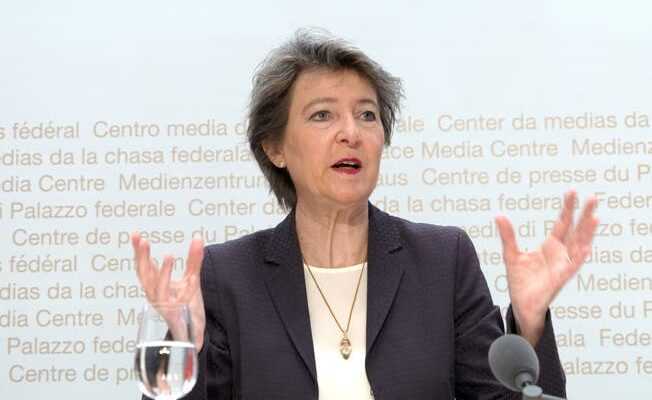What next given the turbulence on the energy markets? Federal Councilor Simonetta Sommaruga advocates more self-sufficiency and comments on a possible boycott of Russian gas.
“There could be a wildfire”: Federal Councilor Simonetta Sommaruga provided information on April 14, 2022 about the rescue package for the electricity industry.
tri.
· Switzerland’s failures in energy policy are taking their toll. There was already great turbulence on the electricity markets last year and correspondingly high price fluctuations. In the course of the Ukraine war, the situation has worsened – and triggered hectic activity in politics. “In the worst case, there could be a wildfire that could also affect Switzerland and endanger our power supply,” warns Energy Minister Simonetta Sommaruga in an interview with the “Sunday newspaper”. A few days ago, the state government therefore decided to create a legal basis for a rescue package for system-critical electricity companies. The federal government anticipates that in a worst-case scenario it would have to make up to CHF 10 billion available to ensure that the energy supply remains secure.
It seems certain that energy prices on the world markets will not fall in the foreseeable future – with far-reaching consequences, as Federal Councilor Sommaruga emphasizes: “If prices remain high or even rise, this can affect households in particular, but also SMEs with high energy consumption , such as bakeries, will actually become a problem.» The best remedy against this is “to convert the houses as quickly as possible to local energies, for example to wood or heat pumps”. To promote this, 4.5 billion francs are available.
But the conversion does not happen overnight. The SP magistrate is also aware of this, which is why aid measures for households are now being examined. She is in contact with Finance Minister Ueli Maurer in this regard, has set up a working group and has already held talks with the cantons. «Electricity tariffs for households are set once a year in Switzerland. The next round of tariffs will take place in autumn, and then we will have to watch closely how much private electricity prices are rising. And what measures are needed, at least for low-income households and for certain SMEs.” Sommaruga did not become more specific in an interview with the “Sonntags-Zeitung”. However, she already ruled out a cap on energy prices, as in France, for example: That is not possible, “because we have 600 energy suppliers with very different tariff systems”. A uniform tariff is therefore not possible.
Sommaruga also commented on the debate about phasing out Russian gas as effective sanctions against Vladimir Putin’s regime. The Swiss gas industry has no direct contracts with Russian companies, it buys the gas in Europe. Russian gas only reaches Switzerland indirectly. A gas boycott is also not a question of neutrality: “The question is whether you can afford it in terms of energy policy. That’s why we have to see that we get away from gas, including oil. Every year, Switzerland sends eight billion Swiss francs abroad for this purpose. We better invest this money with us.”
